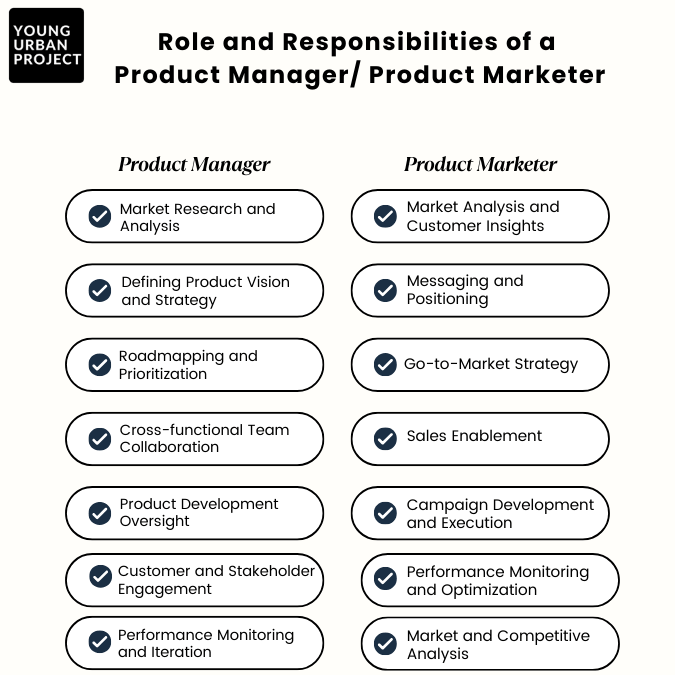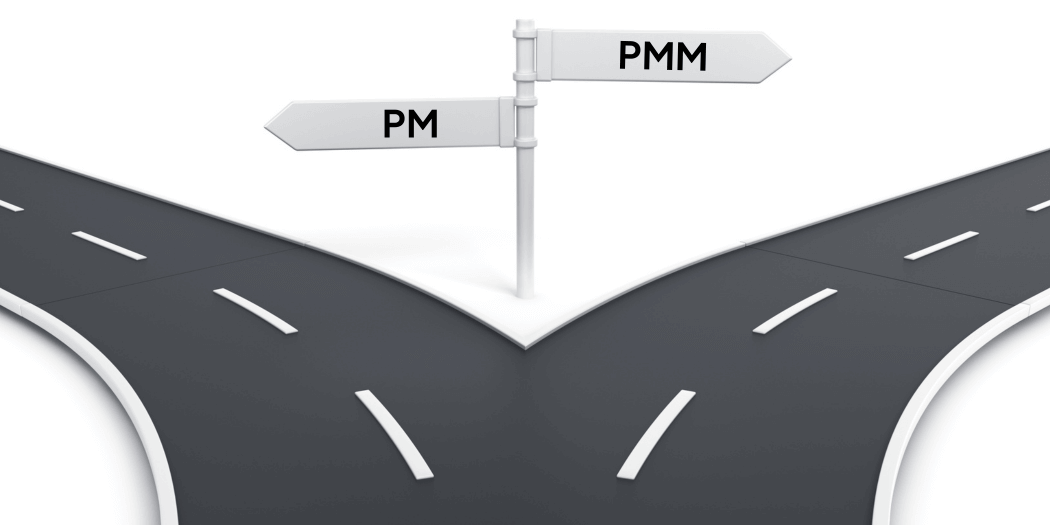In this definitive guide, we will be understanding the difference Between a Product Manager vs Product Marketer. While both roles work closely with Product, there are distinct differences between both roles. However, some overlaps make these roles linked at various stages of product lifecycle.
We will also attempt to understand their unique roles, responsibilities, and how they drive product success in today’s competitive landscape.
This is ideal for professionals seeking clarity on product development and marketing strategies. Whether you’re navigating career choices or seeking to optimize team dynamics, this comprehensive comparison will shed light on their responsibilities, skill sets, and collaborative efforts.
Introduction
Product Manager vs Product Marketer are pivotal roles within any organization aiming to develop and market products effectively. Despite often overlapping in their goals, each role brings distinct expertise and focuses on different aspects of the product journey.
Table of Contents
Who is a Product Manager?
A Product Manager (PM) is a key role within an organization responsible for the strategic development and management of a product or portfolio of products. PMs serve as the primary link between the customer, business stakeholders, and the development team, ensuring that the product aligns with the company’s overall strategy and meets market needs effectively. They are instrumental in driving the entire lifecycle of a product, from conception through launch to ongoing enhancement and iteration.
PMs undertake a variety of responsibilities, including market research to identify opportunities and customer pain points, defining the product vision and strategy, prioritizing features based on business value and user feedback, and collaborating cross-functionally with teams such as engineering, design, marketing, and sales. They oversee the development process, ensuring that the product meets quality standards and timelines while managing resources effectively. PMs also play a critical role in gathering and analyzing data to make informed decisions, monitoring product performance post-launch, and iterating on features to optimize user experience and achieve business goals.
Role and Responsibilities of a Product Manager
Product Managers (PMs) play a pivotal role in overseeing the entire lifecycle of a product, from its inception through to its launch and beyond. They serve as the linchpin between various teams and stakeholders, ensuring that the product meets both customer needs and business objectives. Here’s an in-depth look at the role and responsibilities of a Product Manager:

1. Market Research and Analysis
Product managers do extensive market research to better understand customer wants, industry trends, and competitive landscapes. They collect and evaluate data to find market opportunities and gaps that the product can efficiently fill.
2. Defining Product Vision and Strategy
PMs collaborate closely with stakeholders, including executives, developers, designers, and marketers, to define a clear product vision and strategy. This involves aligning the product roadmap with business goals and ensuring that every feature and enhancement contributes to the overall vision.
3. Roadmapping and Prioritization
Creating and maintaining a product roadmap is a key responsibility of Product Managers. They prioritize features and functionalities based on customer feedback, market research, and business priorities. PMs must balance short-term needs with long-term goals to maximize the product’s impact and ROI.
4. Cross-functional Team Collaboration
Product Managers work across departments, bridging gaps between engineering, design, marketing, sales, and customer support teams. They facilitate communication and collaboration to ensure that everyone is aligned with the product’s goals and timelines.
5. Product Development Oversight
Throughout the development process, PMs oversee every stage, from initial concept through design, development, testing, and release. They ensure that the product meets quality standards, deadlines, and budget constraints while also addressing any technical or operational challenges that arise.
6. Customer and Stakeholder Engagement
PMs actively engage with customers to gather feedback, validate product concepts, and iterate on features based on real-world usage. They also communicate progress and updates to stakeholders, keeping them informed and aligned with the product’s development.
7. Performance Monitoring and Iteration
After the product is launched, PMs monitor its performance using metrics such as user adoption rates, customer satisfaction scores, and revenue growth. They analyze data to identify areas for improvement, prioritize future enhancements, and iterate on the product to maintain its relevance and competitiveness in the market.
What is a Product Marketer?
A Product Marketer is a critical role within an organization focused on driving the successful adoption and growth of a product in the market. Unlike Product Managers who oversee the development and strategic direction of a product, Product Marketers specialize in crafting compelling messaging, positioning strategies, and go-to-market plans that resonate with target audiences and drive customer acquisition.
Role and Responsibilities of a Product Marketer
Product Marketers play a pivotal role in translating the technical features and capabilities of a product into value propositions that resonate with customers. Their responsibilities typically include:
- 1. Market Analysis and Customer Insights
Conducting market research to better understand customers’ requirements, preferences, and behaviors. Product marketers gather data to inform product positioning and messaging initiatives.
- 2. Messaging and Positioning
Developing clear and compelling messaging that communicates the unique value proposition of the product. They ensure consistency in messaging across all marketing channels to effectively reach and engage the target audience.
- 3. Go-to-Market Strategy
Collaborating cross-functionally with Product Management, Sales, and Marketing teams to develop comprehensive go-to-market strategies. This includes planning product launches, setting pricing strategies, and identifying key promotional channels.
- 4. Sales Enablement
Equipping sales teams with the necessary tools, training, and collateral to effectively sell the product. Product Marketers provide sales teams with product positioning guides, competitive analysis, and customer insights to facilitate successful customer engagements.
- 5. Campaign Development and Execution
Creating and executing marketing campaigns that drive awareness, generate leads, and support customer retention efforts. Product Marketers leverage various marketing channels such as digital marketing, content marketing, events, and partnerships to maximize reach and impact.
- 6. Performance Monitoring and Optimization
Analyzing marketing campaign performance and customer feedback to optimize messaging, targeting, and campaign effectiveness. They use metrics such as conversion rates, customer acquisition costs, and customer lifetime value to measure success and inform future strategies.
- 7. Market and Competitive Analysis
Continuously monitor market trends, competitive landscape, and industry developments to identify opportunities and threats. Product Marketers provide actionable insights to Product Management teams to support product roadmap decisions and strategic planning.
Key Difference Between a Product Manager vs Product Marketer
Understanding the differences between a Product Manager (PM) and a Product Marketer is essential for grasping how these roles complement each other in driving the success of a product. While both roles are crucial for product development and marketing strategies, they have distinct focuses, responsibilities, and skill sets that contribute uniquely to the product lifecycle.
1. Focus and Objective
Product Manager (PM):
- Focus: Primarily on the product itself, its development, and strategic direction.
- Objective: To ensure the product meets market needs, aligns with business goals, and delivers value to customers.
Product Marketer:
- Focus: On the market, target audience, and positioning of the product.
- Objective: To create awareness, drive adoption, and maximize revenue through effective marketing strategies.
2. Responsibilities
Product Manager (PM):
- Conducts market research to identify opportunities and customer pain points.
- Defines the product vision, strategy, and roadmap.
- Prioritizes features and functionalities based on business value and user feedback.
- Manages the development process, ensuring quality, timelines, and budget adherence.
- Collaborates cross-functionally with engineering, design, marketing, and sales teams.
Product Marketer:
- Conducts market analysis to understand customer needs, behaviors, and market trends.
- Develops compelling messaging and positioning that communicates the product’s value proposition.
- Creates go-to-market strategies, including product launches, pricing strategies, and promotional plans.
- Enables sales teams with tools, training, and collateral to effectively sell the product.
- Executes marketing campaigns across various channels to drive awareness and customer engagement.
3. Skill Sets
Product Manager (PM):
- Strong analytical and strategic thinking skills.
- Technical grasp of the product and development process.
- Leadership and project management abilities.
- Ability to prioritize and make decisions based on data and business objectives.
Product Marketer:
- Excellent communication and storytelling skills.
- Market research and consumer behavior analysis expertise.
- Creativity in developing marketing strategies and campaigns.
- Collaboration and influencing skills to align cross-functional teams and stakeholders.
4. Collaboration
Product Manager (PM):
- Works closely with internal teams (engineering, design, marketing, sales) to ensure product alignment with business goals and customer needs.
- Leads the product development process and decision-making.
Product Marketer:
- Collaborates with Product Management, Sales, and Marketing teams to align messaging, campaigns, and strategies.
- Supports sales teams with insights and collateral to facilitate effective selling of the product.
Conclusion
In conclusion, while Product Managers (PMs) and Product Marketers play distinct roles within the product lifecycle, their collaboration is crucial for achieving overall product success.
Product Managers are responsible for guiding the product from inception to launch and beyond, ensuring that it meets market needs and aligns with business objectives. They focus on strategic development, prioritizing features, and managing the product roadmap in collaboration with cross-functional teams.
Product Marketers, on the other hand, specialize in crafting compelling messaging, positioning strategies, and go-to-market plans that resonate with target audiences. They drive awareness, adoption, and revenue growth through effective marketing campaigns and sales enablement initiatives.
By understanding these key differences, organizations can leverage the strengths of both roles to create a holistic approach to Product Manager V/S Product Marketer. Product Managers provide the foundation by developing a product that meets customer needs and business goals, while Product Marketers amplify its value through targeted messaging and strategic market positioning.

